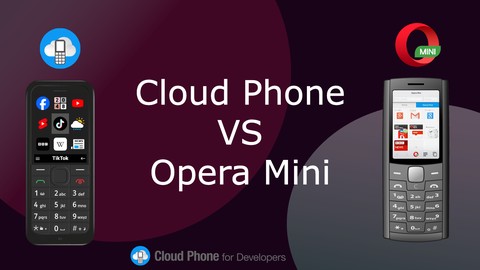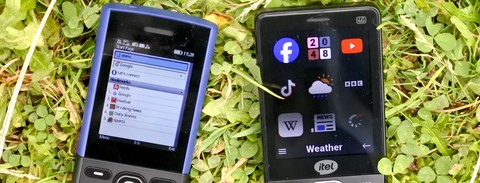Cloud Phone vs. Opera Mini
Cloud Phone is a modern, capable remote browser connecting millions

At a Glance
Cloud Phone picks up where Opera Mini Native left off: providing a modern, capable remote browser for budget feature phones that supports standard web technologies. Based on the Puffin browser, Cloud Phone is built on a reliable foundation with 150M+ installs and 15+ years of secure operation.
Feature Support. Cloud Phone uses a modern Chromium engine, while Opera Mini runs a decade-old Presto engine with limited JavaScript support
Support Model. Opera Mini is supported by advertising, while Cloud Phone is provided to users at no cost and without advertisements
Browser Interface. Opera Mini is a standard web browser with a URL bar, while Cloud Phone only offers widgets submitted and published via the Developer Console
Feature Comparison

Opera Mini Native for keypad phones operates similar on Android using the “Extreme” compression mode. Proxy servers continue to use the discontinued Presto engine (last updated 16 March 2015), and support a limited subset of standard features.
| Feature | Cloud Phone | Opera Mini |
|---|---|---|
| JavaScript Engine | V8 | Presto 2.12.423 |
| ECMAScript | ES6 (ECMAScript 2019) | ES5 (2009) |
| TLS Versions | TLS 1.2, 1.3 | TLS 1.0, 1.1, 1.2 |
| HTTP Versions | 1.1, 2, 3 (QUIC) | 1.1, SPDY |
| Execution Limits | N/A | 2.5 seconds |
| Content Encoding | gzip, zlib, brotli, zstd | gzip, zlib |
| Offline Storage | ✔ Supported | × Unsupported |
| Audio | ✔ Supported | × Unsupported |
| Video | ✔ Supported | × Unsupported |
| Fetch | ✔ Supported | × Unsupported |
| Canvas | ✔ Supported | × Unsupported |
| OpenGL | ✔ Supported | × Unsupported |
| Keyboard Event | ✔ Supported | × Unsupported |
| CSS Grid Layout | ✔ Supported | × Unsupported |
| Custom Elements | ✔ Supported | × Unsupported |
This summary table compares the following versions, the latest at the time of writing.
| Version | Cloud Phone | Opera Mini |
|---|---|---|
| Build Date | March 7, 2025 | July 27, 2020 |
| Client | 2.7.10.65586 | 4.4.34891 |
| Server | Chromium 132.0.6834 | Presto 2.12.423 |
Technology
Cloud Phone is a modern Chromium-based remote browser with a regularly-updated engine (currently v132) that renders complete websites on feature phones. On the other hand, Opera Mini uses the 10-year-old, discontinued Presto rendering engine with very limited support for standard Web APIs.
Supporting Cloud Phone is simple and does not require refactoring or optimization, while you’ll need to make significant changes to make your site work on Opera Mini.
Server Locations
Remote browsers rely on proxy servers in data centers to render and transcode websites. Server locations include:
Cloud Phone
- Singapore
- United States
- South Africa
Opera Mini
- Netherlands
- Norway
- Singapore
- United States
As of March 2025, it appears only Opera Mini servers located in the Netherlands are currently active.
Traffic originates from these locations, with the user’s IP address included in the de facto X-Forwarded-For header.
X-Forwarded-For: 127.0.0.1, 192.168.0.100, 195.189.143.147, 130.236.236.80Opera Mini also sends the less common but standardized HTTP Forwarded header.
Forwarded: for="192.168.0.100:26738"User Agents
Both Cloud Phone and Opera Mini include device information via the User-Agent header.
Opera Mini
Opera/9.80 (SpreadTrum; Opera Mini/4.4.34891/191.347; U; en) Presto/2.12.423 Version/12.16Cloud Phone
Mozilla/5.0 (Cloud Phone; Nokia 225 4G) AppleWebKit/537.36 (KHTML like Gecko) Chrome/132.0.6834.210 Mobile Safari/537.36 Puffin/132.0.2.78264FPCloud Phone Headers
Cloud Phone does not send non-standard HTTP headers.
Opera Mini Headers
Opera Mini also sends the following proprietary headers.
X-OperaMini-Features: advanced, download, file_system, folding, httpping, pingback, routing
X-OperaMini-Phone-UA: NativeOperaMini(Spreadtrum/HW Version: ums9117_m2_4in1;Native Opera Mini/4.4.34876;en)
Device-Stock-UA: NativeOperaMini(Spreadtrum/HW Version: ums9117_m2_4in1;Native Opera Mini/4.4.34876;en)
X-OperaMini-Phone: ? # ?
X-Clacks-Overhead: GNU phX-OperaMini-Features provides an enumerated list of supported features. X-OperaMini-Phone-UA and Device-Stock-UA both contain the device’s default User-Agent reported by the client. X-OperaMini-Phone contains the manufacturer and model name/ number, although it appears to be unsupported on many devices running Opera Mini Native. X-Clacks-Overhead is the most obscure, it’s a non-standardised HTTP header that “allows web authors to silently commemorate someone.”
History
Remote browsers provide a secure, performant way to access websites on affordable, hardware-constrained feature phones. Opera Mini was first released twenty years ago in 2005, loading websites on mobile phones using a proxy server that rendered, transcoded, and compressed HTML, CSS, and JavaScript into the proprieary Opera Binary Markup Language (OBML) format. Back then, users could download Opera Mini for free using Wireless Application Protocol (WAP), or pay €0.50 to install via SMS by texting OPERA to 88881.
For example, commuters can check Gmail, read the local news site or research holiday destinations. There’s almost no limit to what they can do.
– Jon S. von Tetzchner, CEO, Opera Software
Opera Mini began as a Java 2 Mobile Edition (J2ME) application on millions of Java-powered phones. Over time, Opera expanded support to BlackBerry, Symbian, Windows Mobile, Android, and iOS. Since 2011, Opera Mini Native also comes preinstalled on Unisoc (formerly SpreadTrum) feature phones.
Cloud Phone launched in December 2023 in India on devices like the Nokia 106 4G. Built using the same technology behind the Puffin browser, Cloud Phone delivers seamless and uninterrupted access to popular services like YouTube, BBC Hindi, weather, news, and more. Like Opera Mini Native, Cloud Phone comes preinstalled on many Unisoc and ASR feature phones.
Alternatives

Due to hardware limitations, remote browsers are the most reliable solution to render modern websites on budget feature phones. Alternatives are few, but include the Dorado WAP browser that renders Wireless Markup Language (WML) and static XHTML. It also supports images, but not JavaScript, CSS, or multimedia.
WAP browsers eliminate the need for proxy servers, but only support a narrow range of websites like the text-only version of NPR. Nothing is rendered for Single Page Applications (SPAs) that require JS. Moreover, even highly-optimized websites are often too large and trigger a “insufficient memory” warning.
Conclusion
Although Cloud Phone is a younger browser, it offers many features to deliver interactive, multimedia-rich Progressive Web Apps across millions of feature phones. Cloud Phone is built by CloudMosa Inc, a company with a proven track record for security, performance, and scale. Register for the Cloud Phone Developer Program today and start building for the next billion internet users.